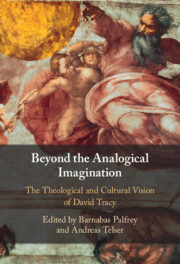Book contents
- Beyond the Analogical Imagination
- Reviews
- Beyond the Analogical Imagination
- Copyright page
- Epigraph
- Contents
- Contributors
- Acknowledgements
- Introduction
- Part I Theology and Culture
- Part II Public and Beyond
- Part III Church and World
- Chapter 7 Justice, Excessive Love, and the Future of Catholic Christianity
- Chapter 8 Theological Dialogue amid Anger and Pain
- Chapter 9 The Church in David Tracy’s Theology
- Part IV From David Tracy
- Part V Post-Script
- Bibliography
- Index
Chapter 9 - The Church in David Tracy’s Theology
from Part III - Church and World
Published online by Cambridge University Press: 28 September 2023
- Beyond the Analogical Imagination
- Reviews
- Beyond the Analogical Imagination
- Copyright page
- Epigraph
- Contents
- Contributors
- Acknowledgements
- Introduction
- Part I Theology and Culture
- Part II Public and Beyond
- Part III Church and World
- Chapter 7 Justice, Excessive Love, and the Future of Catholic Christianity
- Chapter 8 Theological Dialogue amid Anger and Pain
- Chapter 9 The Church in David Tracy’s Theology
- Part IV From David Tracy
- Part V Post-Script
- Bibliography
- Index
Summary
This article discusses David Tracy’s implicit and explicit reflection on the church as a community of Christian praxis. The church is both a social and a theological reality, just like its theological partner-reality ‘the world’. This means that no concrete expression of the Christian church may pronounce itself wholly or uniquely adequate to its theological field; neither can any boundary between ‘church’ and ‘world’ be rendered theologically determinate or fundamental. So Tracy’s thinking focuses on the centre of the church, not on its boundaries. As gift and sacrament, the church participates in God’s grace as disclosed in God’s self-manifestation in Jesus Christ. In bearing witness to this event, the church’s critical and self-critical praxis of love is borne upon mystical-prophetic discourses and dialogues with otherness without and within. Ecclesiology, therefore, emerges only in fragments and not as a closed system. Tracy’s ecclesiology is everywhere a function of an account of God and reality. A Christian church that learns a Tracyean route to naming God aspires actively, contemplatively, and fragmentarily to realise itself in answering fashion as an ‘institution of love’.
- Type
- Chapter
- Information
- Beyond the Analogical ImaginationThe Theological and Cultural Vision of David Tracy, pp. 192 - 208Publisher: Cambridge University PressPrint publication year: 2023

